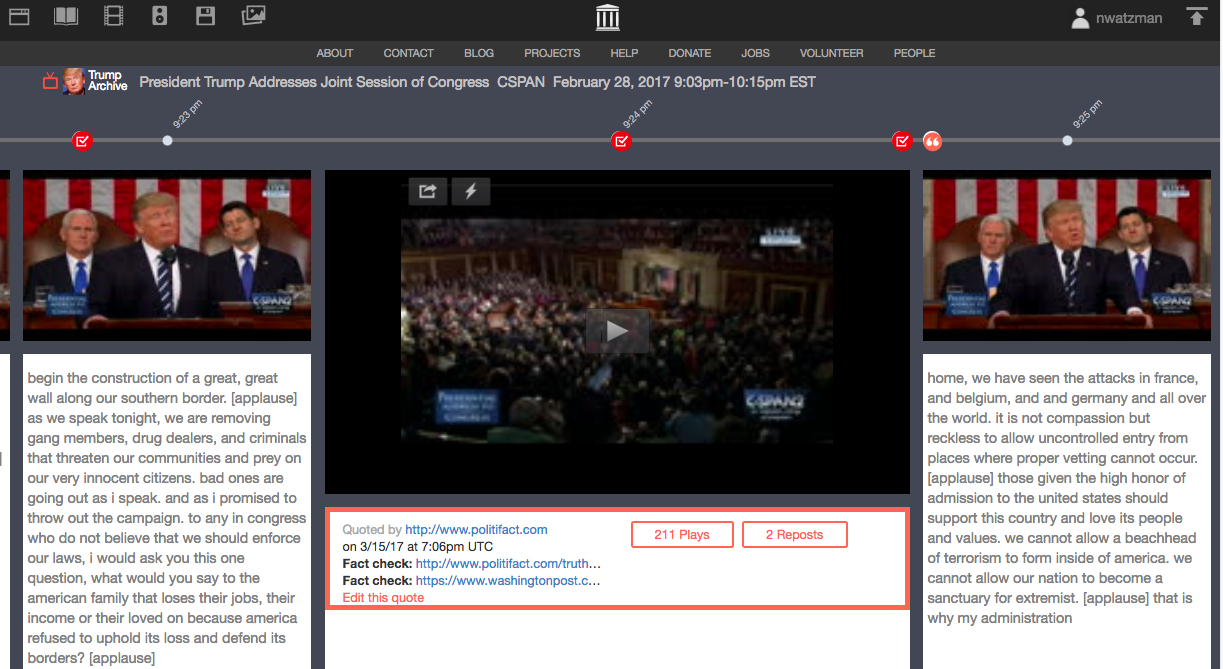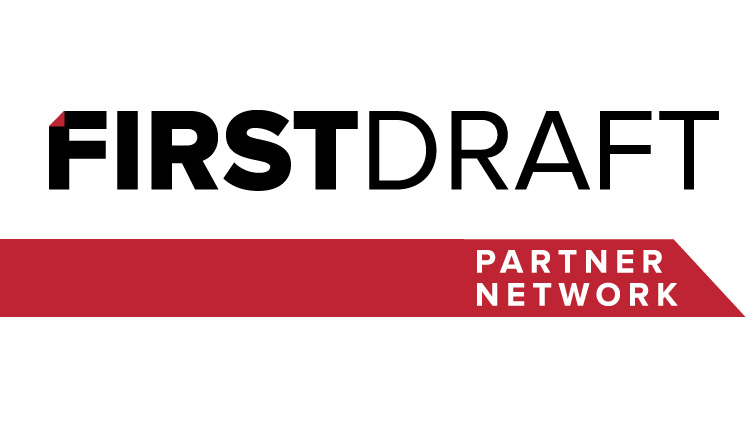The Trump Archive launches today with 700+ televised speeches, interviews, debates, and other news broadcasts related to President-elect Donald Trump, created using the Internet Archive’s TV News Archive.
A work in progress, the growing collection now includes more than 520 hours of Trump video. The earliest excerpt dates from December 2009, and the collection continues through the present. It includes more than 500 video statements fact checked by FactCheck.org, PolitiFact, and The Washington Post’s Fact Checker covering such controversial topics as immigration, Trump’s tax returns, Hillary Clinton’s emails, and health care.
Full list of fact checks with links to video statements in TV News Archive.
Visit the Trump Archive.
Reporters, researchers, Wikipedians, and the general public are invited to quote, compare and contrast televised statements made by Trump.
- Use clips in your articles and videos.
- Create supercuts on topics like Trump’s perspectives of the US press, made with our online “Popcorn” video editor.
- Let us know what content we are missing.
- If you have the technical resources, help us enhance search and discovery by collaborating in experiments to apply artificial intelligence-driven facial recognition, voice identification, and other video content analysis approaches.
- How would you like to use such an archive? Comment below, or write us info@archive.org
Why a Trump Archive?
We draw on this material, and our experience with building the successful Political TV Ad Archive, to create a curated collection of material related to Trump, with an emphasis on fact-checked statements. The video is searchable, quotable, and shareable on social media.
In response to requests by our fact checking partners on the Political TV Ad Archive project and other media, we hope to provide assistance for those tracking Trump’s evolving statements on public policy issues.
For example: in July 2016, Trump told ABC’s George Stephanopoulos, “I have no relationship with Putin…I don’t think I’ve ever met him.” Stephanopoulos pressed him on this point during the interview, saying that Trump had previously claimed a relationship with him. PolitiFact ruled this statement by Trump as a “full flip flop”: “Trump’s denial of a relationship with Putin contradicted what he had said on multiple previous occasions.”
By providing a free and enduring source for TV news broadcasts of Trump’s statements, the Internet Archive hopes to make it more efficient for the media, researchers, and the public to track Trump’s statements while fact-checking and reporting on the new administration. The Trump Archive can also serve as a rich treasure trove of video material for any creative use: comedy, art, documentaries, wherever people’s inspiration takes them.
We consider the Trump Archive to be an experimental model for creating similar archives for other public officials. For example, we’ll explore the idea of creating curated collections for Trump’s nominees to head federal agencies; members of Congress of both parties (for example, perhaps the Senate and House majority and minority leadership); Supreme Court nominees, and so on.
While we’ve largely hand-curated this collection, we hope to collaborate with researchers to apply machine intelligence to expand this collection, building others and making search of our entire TV library vastly more efficient.
Such experimentation builds on our experience with first prototyping and then developing the the Political TV Ad Archive. Our first collection of political TV ads, covering ads aired in Philadelphia during the 2014 mid-term elections, was built largely by hand. However, in preparation for the Political TV Ad Archive, we created a new open source tool, the Duplitron, that was able to identify ad airings by deploying audio fingerprinting. During the course of the project, we collected nearly 3,000 ads and documented more than 364,000 ad airings.
Why now?
Just because something is broadcast or posted on the internet doesn’t mean it’s forever. Reporters and the public may take it for granted that a news story or a piece of broadcast video is only a google search away, but as newspapers, companies, and organizations fail and change, often vital information is lost. The web is far more fragile than is generally understood.
The Internet Archive’s core mission is to preserve and make accessible our cultural heritage. For example, the Wayback Machine preserves websites over time, so if pages or sites are deleted, they can still be found. For example, Rachel Maddow of MSNBC reported on how the president-elect had deleted a web page from the official transition website that had touted Trump properties.
We also preserve political and news content through the TV News Archive, which contains news broadcasts by major networks back to 2009, searchable via closed captioning. The Political TV Ad Archive archives 2016 election ads along with relevant fact checks and follow-the-money reporting by our journalism partners. Our Political Campaign web archive is preserving election-related online media, such as select candidate and political groups’ websites and Twitter and Instagram feeds.
What’s next
The Trump Archive is a work in progress; we will continue to refine the content. We hope to work with others to broaden the materials available, to make search more efficient, and otherwise make it more useful for the public. We’d like you feedback and suggestions.
The great American author William Faulkner wrote, “The past is never dead. It’s not even past.” We believe that the Trump Archive, in preserving the past, can help the public engage more knowledgeably with our future.
Many thanks to the thoughtful contributions of Robin Chin, Jessica Clark, Katie Dahl, Katie Donnelly, John Gonzalez, Wendy Hanamura, Tracey Jaquith, Jeff Kaplan, Roger Macdonald, Ralf Muehlen, Craig Newmark, Sylvia Paull, Alexis Rossi, Dan Schultz, Nancy Watzman, our Partners & Funders and the Vanderbilt Television News Archive – on whose shoulders we stand.


